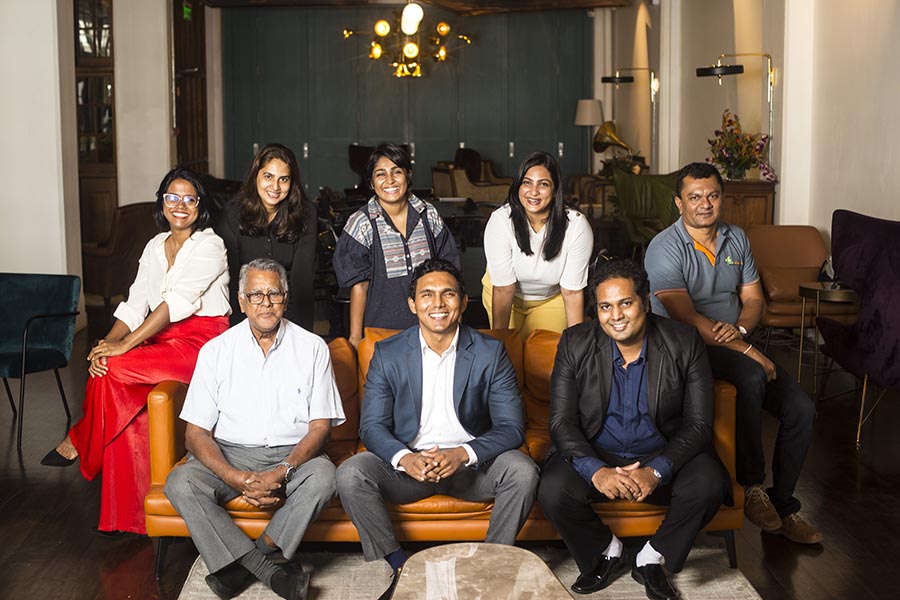Storming change and disrupting sectors which have often been left behind by the tech revolution and new age thinking is something which Randhula de Silva, CEO of GoodLife X has become somewhat of a savant in.
GoodLife X, founded in 2018 has been making strides in accelerating startups and SMEs in the food, agriculture, wellness, travel, and sustainable design space, which are now developing world class products and providing greater access to the ‘Good Life’.
Meeting her at Hatch, she spoke to Newswire about her journey in uplifting startups, unproductive competition and the importance of mergers between the government sector and private sector.

The GLX Garage SME Cohort of 2020
How many have you inspired with Good Life X?
I can give you a number but in reality, we never know. The impact you make on people beyond the companies you immediately work with and how you have influenced the larger community is rarely known to you at a glance. Through Good Life X since 2018, we have worked with 40+ companies, and guided and helped them transform from where they started. And it is evident in where they are today.
Change is happening in multiple forms, and the impact you make may not be something that we have planned, but comes through the journey of growth.
Through this change, trends are set and ripple effects are created. Impacting entrepreneurs and consumers alike to be more conscious in their choices, their business practices and consumption patterns. We are enabling entrepreneurs to find novel solutions to problems in traditional sectors, keeping sustainability and innovation always at the heart of what we do. This is turn is creating a larger impact in their communities, their employees, and is ultimately unleashing good and wholesome products to the market which are in turn enriching the lives of conscious consumers.
How do you manage two successful ventures in the past two years?
When I took on the work at Hatch, as the CEO and its Director of programs, the seed of GLX was already planted and growing. Both are deeply connected but different ventures. I had to make sure I gave my fullest to hatch in its years of inception while nurturing GLX. It wasn’t easy but it taught me a lot about being meticulous and also understanding the roles and the need for each of these. They’re different roles, and the teams are different too. As a leader, you must learn to trust your team and give ownership to bring in their own creativity and abilities to work. This is something I don’t see happening often enough. I believe all that I am doing is connected at a larger level.
What have you learnt through your work with GLX and how have businesses/brands profited?
What I have learnt is there is no “one way” of doing things, everyone has a unique way of achieving something. There is no one model or a switch to flick to being successful. Being respectful of everyone’s journey is very important, and support the path of another is travelling towards a good life.
Sri Lankans, Sri Lankan businesses and resources have so much to offer to the world, but we are always stuck in our island mentality and colonial hangovers, and always take things as given without challenging the status quo or daring to colour outside the boxes.
The problem we experience in Sri Lanka is that the opportunities are limited because it’s an Island nation, communities are smaller and the market even smaller. Due to this people become toxically competitive towards opportunities. Healthy competition is good and needed, but being driven with insecurities and constantly fighting among ourselves to split a pie without working with each other to grow the pie had made us loose out many golden opportunities as a country. We’re constantly elbowing each other and fighting sideways without progressing forward as a nation.
It’s been two years since we started working directly with companies through GLX, and we have seen how their approach to business makes a great difference to their communities, employees and end consumers at large. Companies like Owita organics, Kimbula Kithul, Serendipol, Coco House, House of Lonali, Olai are creating change on the ground from community level to an entire industry at large. Their stories can inspire many more entrepreneurs who are stepping into the area of doing sustainable businesses.
How do you see the current business structure for Sri Lanka?
I believe the business community is striving to push through all the barriers, and doing its best to make it work. The challenge is always in creating bridges between the private sector and the public sector. One cannot survive, without the other and there needs to be close synchrony. The policies coming from the government sector needs to be co-created with people on the ground who are doing the work and driving change.
The knowledge and academia sectors should be geared to cater to the private sectors growing needs as well. The great disconnect we have between public and private sectors and academia needs to be bridged for our business environment to thrive.
Which industries should the government focus on?
The government is showing and growing a lot of interest in high-tech, businesses and industries, it’s great to be in a time and region where technological efforts are blooming. To make sure we use the best of this emergence, it’s very important to look at the tech sector as an amplifier to the traditional sectors like agriculture, tourism and other potential natural value-added sectors of the country.
We have so much natural resources in our country that the world is in dire need of, which isn’t utilized to its fullest value.
The focus should be on enhancing the value brought in by natural value chains, and narrowing the gap in the value addition process by creating technological bridges. (NewsWire)